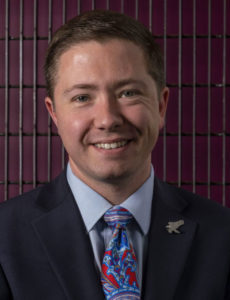 The Hurtt Locker is a biweekly opinion column. The views expressed are solely the author’s.
The Hurtt Locker is a biweekly opinion column. The views expressed are solely the author’s.
I am encouraged by the shift in the national (and local) discussion about citizens’ relationship to the law and with law enforcement we have seen take place over the last few weeks.
In the many rallies, marches, and protests, people of all races and creeds have united to call into question overcriminalization and police practices that quite frequently lead to the unnecessary and tragic deaths of our black and brown brothers and sisters.
Americans have shifted our thinking on a range of practices related to policing in relatively short order. From limiting the transfer of military equipment to police departments to banning no-knock warrants and chokeholds, the shift has been dramatic in the wake of the killing of George Floyd by Minneapolis police officer Derek Chauvin.
I anticipate these debates will play out at every level of government, resulting in good and bad proposals. Ahead of a special session later this summer, Virginia’s Legislative Black Caucus released a “comprehensive list of policy priorities,” many of which are broadly supported by Democrats and Republicans alike.
But there’s something missing from the dominant conversation around overcriminalization and policing, especially in communities like Arlington.
I wanted to title this column “A libertarian defense of Black Lives Matter,” but I know the political realities of the Arlington community. Many of my neighbors have an unshakeable faith in the power of government, and they do not seem to connect the intentions they have for any number of government policies with the outcomes that manifest in the execution of those policies. I have to sneak these libertarian civics lessons into the commentary.
You see, there is no law so trivial that the government will not kill you to enforce it. Be it Eric Garner for loitering and selling loose cigarettes or Atatiana Jefferson for leaving her front door open or Stephon Clark for holding a mobile phone in his grandmother’s backyard, each law we clamor to enact gives law enforcement officers another opportunity — another excuse — to pull their firearms on otherwise peaceable citizens.
I write a lot about criminal justice reform, and I am involved in advancing substantive public policy change in the criminal justice space because it is the most public way people view execution of the law in their communities. Every frustrating or tragic interaction with the law causes someone else to question the proper role of government — and to consider the solutions we could achieve and the lives we could save if we relied more heavily on the other key institutions that strengthen our society.
This moment is calling out systemic racism and injustice. Right now, the American people are considering the consequences of criminalizing poverty and using the law to target fellow Americans who fall overwhelmingly on the lower end of the socioeconomic scale.
The uncomfortable fact of the matter is, it is easier in this country to be rich and guilty than poor and innocent. We must consider that reality when weighing new laws or harsher penalties for old laws.
If we are a community that believes #BlackLivesMatter, we must advocate for the repeal of countless laws that by their very nature increase the likelihood that someone — disproportionately someone black or brown — will be forced to interact with law enforcement. I’m here for that advocacy.
Matthew Hurtt is an 11-year Arlington resident who is passionate about localism and government transparency and accountability. Hurtt is a member of the Arlington Heights Civic Association and was previously the chairman of the Arlington Falls Church Young Republicans. Hurtt prides himself on his ability to bring people of diverse perspectives together to break down barriers that stand in the way of people realizing their potential. He is originally from outside Nashville.

